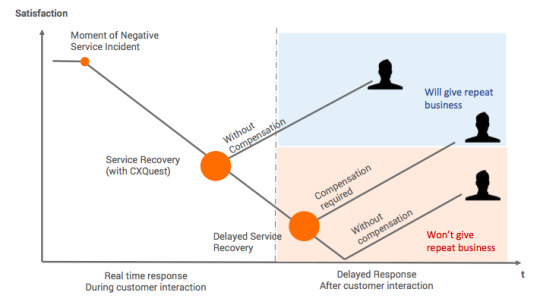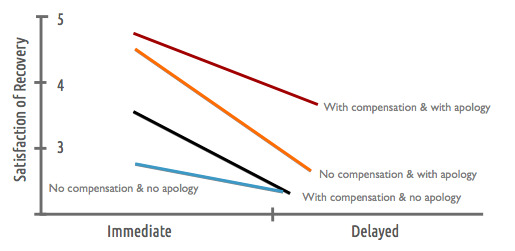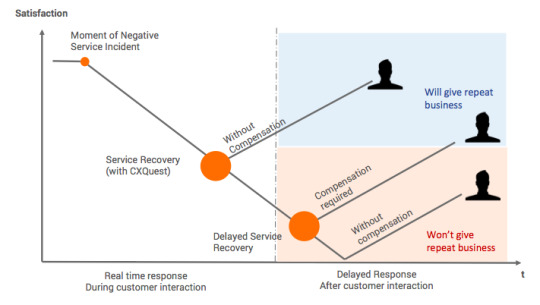Video
youtube
CXGroup.Co -CX Interactions is an outsourcing solution that helps businesses create advanced CX capabilities and impress customers with great responsiveness at minimal costs. CX Interactions can perform outsourced activities under your company’s brand name or as a neutral third party.
#customer experience#journey mapping#satisfaction survey#cxgroup#cxquest#feedback survey#mobile feedback#mapping
0 notes
Video
youtube
CX Group’s highly specialized consultants will help your company assess what your customer experience is lacking and will guide you through the improvement process.
#cxgroup#journey mapping#consulting#customer experience#feedback survey#survey software#satisfaction survey#cxquest#journey maps#cx consulting
0 notes
Text
Service Recovery Strategies – It pays off to be fast to re-build satisfaction, create loyalty, save on compensation costs.
Great companies are not only operationally strong, but also fast to respond to customer issues. Based on industry research and on our customer’s set of experiences, it is evident that speed of reaction is probably the most important element in successful service recoveries. Most reports cite a 96% chance of a customer repeatedly giving business to the merchant if a speedy recovery had taken place.
Different options of reacting to customer feedback exist, typically they are one of the following three (mostly a combination thereof):
Remedy
The ‘Fix’. Ideally, a business will pro-actively listen to the customer’s requirements prior to the commencement of the service experience or will perform some sort of in-experience ‘real-time listening’ while the experience is still ongoing (see here for examples in the travel industry). If service is not recovered in real time, customers often end the experience with an unfulfilled requirement. Businesses try to recover in such cases by first fulfilling the basic requirements of the customer.

Apology
When the service experience doesn’t deliver on even the most basic expectations of the customer, then an apology is most likely expected by the customer. A businesses’ apology means to the customer that the business confirms that it does consider the customer’s business more important than it just manifested through the last service incident and that the treatment was in error and not intended. ‘What you just experienced wasn’t in line with the way we see you. You’re still extremely important to us’.
Compensation
In some cases, the service incident leads to a damage or loss that the customer may expect the business recover. Compensation means reinstating the (mostly) financial condition that was or would have been in place without the negative service incident or if service was performed without any issues.
So, given these three different key remedial actions, which one do you focus on? Are they all equally effective in ensuring that the customer will continue to patronize the business?
…Well, it depends. As a rule of thumb:

Providing remedy (fixing it, getting results), should be considered as long as effecting the expected outcome is still meaningful to the customer (e.g. purchases made for fixed-date events are no longer meaningful after the passing of the a specific date).
Apologies don’t cost the business and should be performed as matter of courtesy, but it pays off to make sure that the apology comes across as honest and heartfelt and generally that is only the case, if the customer sees that the service agent really tried but their hands are/were really tied. Apologizing without genuinely trying to remedy an issue can come across as almost downright mean to the customer and may be interpreted as attempts to avert customer issues, rather than expression of empathy.

Compensation can be costly to the business and is generally expected by the customer if a loss really occurred. Offering compensation to try to recover for service that was delivered in e.g. in bad style generally has not proven effective in securing repeat business from the customer.
Timing is everything
Independent of the recovery strategy selected, one aspect that stands out for any recovery method is the speed at which it occurs. Apologies, which are low cost recovery methods for the business, (therefore from a strictly economical perspective a preference) are dramatically more effective if they are made within a given timing. So much so that a timely apology renders financial compensation useless.
Research reports show how little effect compensation can have if it is offered late or without an apology. Recoveries that included only a speedy apology and no compensation yield better recovery results than offering compensation and apology with a delay.
(chart by Wirtz/Mattila*)
Time your ‘recovery’ even earlier: in- and pre-experience
We see overwhelmingly encouraging results when we move the recovery point even earlier, to moments while a customer is still experiencing the product or service. One such example is picking up issues that guests experience while they are still on site in the hotel. Compensation expectations are entirely mitigated because expected results can be generated with almost no or just little delay. Even better results are seen when we disarm the more critical customer by trying to prepare their experience customizing their experience as per their preferences. Here, an example would be asking a guest if there are any specific requests they may have before they arrive for their stay (more examples here). In these cases, customers are ‘tuned’ positively and are generally easier to please throughout the experience live cycle.
A great way to achieve this is to try to move from experience surveying to more ‘utility’ type questioning techniques where the emphasis is less on gauging from the customer how the service was perceived but more on whether there are any imminent issues the customer is experiencing. Ask less, ‘how did we do’, but more of ‘what can we do’ and ask it in a simple and hard-to-refuse manner (SMS messaging, 1 field NPS style request processing, see the CXQuest solution for examples)
Further reads:
*Wirtz/Mattila, NUS, School of Hotel Penn State, 2002, ‘Consumer responses to compensation, speed of recovery and apology after a service failure’
Kwon/Jang, School of Hotel Penn State, Tourism & Hospitality Management Purdue University: ‘Effectiveness of compensation of Service Recovery: Roles of perceived equity and relationship level’, 2010
Kau/Loh, NUS ‘The effects of service recovery on consumer satisfaction: a comparison between complainants and non-complainants’ 2006 http://www.iseg.utl.pt/aula/cad1228/effects_service_recovery.pdf
#journey mapping#customer experience#survey software#satisfaction survey#customer consulting#cxgroup
0 notes